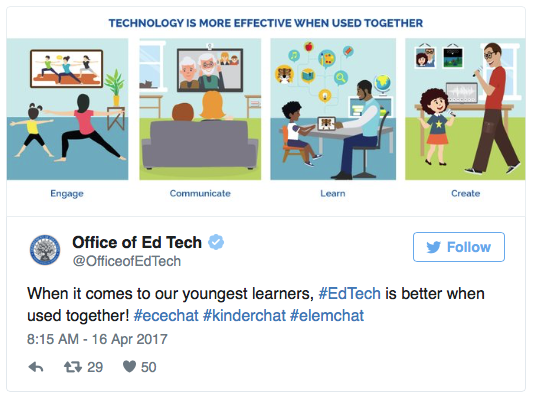School-Issued Computers ‘Spy’ on Children Without Parental Consent
 A new report finds that, under the guise of “personalized learning,” school-issued computer devices — now distributed to one-third of K-12 students in schools across the United States — are serving to collect and store an unprecedented amount of personal data on children without their parents’ notice or consent.
A new report finds that, under the guise of “personalized learning,” school-issued computer devices — now distributed to one-third of K-12 students in schools across the United States — are serving to collect and store an unprecedented amount of personal data on children without their parents’ notice or consent.
A newly released investigation by Electronic Frontier Foundation (EFF) reveals student use of technology in school has grown at a profound rate, especially with free or low-fee devices issued by schools.
The education technology industry, according to the report, is now valued at over $8 billion.
Approximately half of the devices issued to U.S. children are Google Chromebooks, with about 30 million students, teachers, and school officials using Google’s G Suite for Education, observes EFF.
Student information collected by education technology services through these devices includes not only personally identifying information (PII) – such as name and date of birth – but also browsing history, location information, contact lists, and behavioral data.
Student data is also often automatically uploaded to the cloud – all without the knowledge of parents.
 In 2012, Jose Ferreira, CEO of ed tech company Knewton, observed in a video at the U.S. Education Department’s Office of Educational Technology, “Education happens to be, today, the world’s most data mineable industry by far… Education beats everything else, hands down.”
In 2012, Jose Ferreira, CEO of ed tech company Knewton, observed in a video at the U.S. Education Department’s Office of Educational Technology, “Education happens to be, today, the world’s most data mineable industry by far… Education beats everything else, hands down.”
Because the data collected is labeled necessary for “individualized” instruction, parents who do become aware of the mining and wish to have their children opt out of the collection are often unable to do so. In fact, many of these parents are painted as “paranoid” and behind the times.
“We were given no information about our first-grader receiving a tablet this year,” one Maryland parent responded to EFF’s parent survey regarding transparency. “And when we ask questions, there is little information given at every level.”
“I have never received any written policy about how many apps the school uses and how they collect student data,” a North Carolina charter school parent said in response to EFF’s survey. She added:
The district maintains a website for parents to obtain information regarding technology in the classroom, but I have not found anything there about student privacy. When we asked for the apps that the school was using, we were hoping to see in writing what they’re using. Instead, we got a short, verbal list—but when we look at our son’s iPad, we see a lot more programs than what they told us about.
“In short, technology providers are spying on students—and school districts, which often provide inadequate privacy policies or no privacy policy at all, are unwittingly helping them do it,” EFF asserts regarding its investigation into 152 education technology services.
The report addresses ed tech companies’ failure to regulate themselves with regard to student data privacy as well as the major loophole in the federal Family Educational Rights and Privacy Act (FERPA).
 Colorado parent activist Cheri Kiesecker says Big Data has been given free rein under the guises of both “personalized learning programs” and workforce development, with both Democratic and Republican lawmakers on board with the program.
Colorado parent activist Cheri Kiesecker says Big Data has been given free rein under the guises of both “personalized learning programs” and workforce development, with both Democratic and Republican lawmakers on board with the program.
“There is no evidence that these online ‘personalized’ programs accurately measure or predict,” Kiesecker tells Breitbart News. “In fact we see quite the opposite. Algorithms are often biased and wrong. So why are we pushing online learning in classrooms? Data is money.”
 “Personalized learning” includes the collection of children’s social, emotional, and psychological data. In a column at the Atlanta Journal-Constitution, American Principles Project senior fellow Jane Robbins notes the collection of social and emotional learning (SEL) data is promoted in the federal Every Student Succeeds Act (ESSA):
“Personalized learning” includes the collection of children’s social, emotional, and psychological data. In a column at the Atlanta Journal-Constitution, American Principles Project senior fellow Jane Robbins notes the collection of social and emotional learning (SEL) data is promoted in the federal Every Student Succeeds Act (ESSA):
This trend is bolstered by the recent fed-ed bill, the Every Student Succeeds Act, which encourages schools to include such non-academic measures in their accountability ratings. It’s bad enough that the feds demand accountability – which should be to parents, not federal or state bureaucrats – but it’s even worse that they dictate how that accountability should look. So much for the bi-partisan propaganda that ESSA ended federal education mandates.
Pediatrician Dr. Karen Effrem is president of Education Liberty Watch and executive director of the Florida Stop Common Core Coalition. In a column at the National Pulse, she observes that organizations such as the National Association of State Boards of Education and the American School Counselors Association openly acknowledge that a primary purpose of the Common Core State Standards is “to mold and profile students’ attitudes, beliefs and behavior — through what’s called social emotional learning (SEL) or ‘21st Century Skills.’”
“The Every Student Succeeds Act requires other factors besides student achievement in their mandated accountability plan, which is a wide gateway for social emotional assessment and data collection,” Effrem tells Breitbart News. “State (Common Core) Assessments and The National Assessment of Educational Progress (NAEP) – also known as The Nation’s Report Card – are already starting to include mindset and school climate questions either as surveys or as part of the tests themselves.”

Michelle Malkin
In a recent episode of CRTV’s Michelle Malkin Investigates, the conservative author and commentator asserts, “Rather than protecting student privacy, the government is a complicit partner in eroding it. We’ve gone from No Child Left Behind to Every Child Data Mined.”
Malkin details the data-mining situation:
Every webpage viewed, every answer given, every grade received becomes part of a digital digest of students’ interests, thoughts, abilities, and conduct. And that data doesn’t always stay in the classroom. More and more, big corporations are gaining access. At first glance it’s just information broken down into strings of numbers stored on a computer. The corporations ask for the data and offer the very computers and apps the students use in class as an incentive to hand it over.
Data for dollars might seem like a fair trade until you realize tech companies are taking advantage of our youngest and most vulnerable population, our kids.
Malkin, too, stresses the role of the federal government in the collection of private student data:
The government is not only joining in but also encouraging and mining the data of our children. Washington meddlers are already on the ground and in our schools gathering intimate information on your family. Through Common Core, the feds are funding and mandating invasive longitudinal databases, collecting highly personal information. It’s data they’ll have forever, data that can never be unseen, your children’s privacy ripped away as they tracked from womb to tomb.
Grassroots parent activists battling against the Common Core standards in their individual states say the Trump administration would show it stands up for parental rights by reversing the Obama administration’s regulatory gutting of FERPA.
The former president’s deputies in the federal education department essentially nullified FERPA by forbidding parents the ability to sue a school that discloses their children’s personal data.
“The changes that weakened FERPA need to be repealed,” Kiesecker says. “We need to reinstate parental consent before their children’s personal information is marketed, and offered up to researchers and corporations. Parents and students should be able to own and control their own data.”
Written by Dr. Susan Berry and published by Breitbart ~ April 17, 2017.
 FAIR USE NOTICE: This site contains copyrighted material the use of which has not always been specifically authorized by the copyright owner. We are making such material available in our efforts to advance understanding of environmental, political, human rights, economic, democracy, scientific, and social justice issues, etc. We believe this constitutes a ‘fair use’ of any such copyrighted material as provided for in section 107 of the US Copyright Law. In accordance with Title 17 U. S. C. Section 107, the material on this site is distributed without profit to those who have expressed a prior interest in receiving the included information for research and educational purposes. For more information go to: http://www.law.cornell.edu/uscode/17/107.shtml
FAIR USE NOTICE: This site contains copyrighted material the use of which has not always been specifically authorized by the copyright owner. We are making such material available in our efforts to advance understanding of environmental, political, human rights, economic, democracy, scientific, and social justice issues, etc. We believe this constitutes a ‘fair use’ of any such copyrighted material as provided for in section 107 of the US Copyright Law. In accordance with Title 17 U. S. C. Section 107, the material on this site is distributed without profit to those who have expressed a prior interest in receiving the included information for research and educational purposes. For more information go to: http://www.law.cornell.edu/uscode/17/107.shtml
